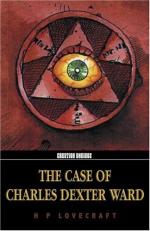|
This section contains 365 words (approx. 2 pages at 300 words per page) |

|
The Case of Charles Dexter Ward belongs to the Faustian tradition. In the 1590s, the English playwright Christopher Marlowe borrowed from an old German legend and wrote Dr. Faustus, a tragedy depicting a learned academic who sells his soul to the devil in exchange for unlimited knowledge. In Faust, Part I (1808) and Part II (1833), Goethe elaborates on the philosophical implications of the Faust legend and the implications of the themes of knowledge and damnation. Goethe takes the Neoclassical view that human rationality is itself a truth.
Lovecraft's character Charles Dexter Ward is Faustian in his relentless search for knowledge and in his succumbing to evil. Lovecraft incorporates Marlowe's portrait of absolute evil into his novel, although the role of the devil is replaced by Yog-Sothoth and the Old Ones. Implied in Dr. Faustus is the idea that Faustus is controlled by Mephistopheles, who while pretending to...
|
This section contains 365 words (approx. 2 pages at 300 words per page) |

|




